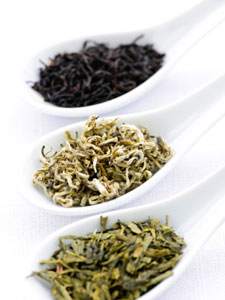Want to be Alert and Clear Headed? Drink Tea!

Tea is all over the news. It seems like nearly every week another study is released that proves the efficacy of tea as a beverage that can help fend off disease, increase brain activity, help bones and teeth, foster alertness, and add fire to physical performance. Many of these studies are done on relatively few people (10-50) and hardly any use high-quality tea; instead, they employ teabags of fannings or dust. Still, the results are very impressive and hold out great hope for applications for disease prevention, particularly those with cognitive malfunction. This is of particular importance for the burgeoning boomer generation facing possible senior moments.
Scientists at the University of Michigan have studied molecules in green tea and discovered that they prevent the "misfolding" of metal-associated amyloids, proteins associated with neurodegenerative conditions, including Alzheimer's disease. Specifically, the EGCG (epigallocatechin-e-gallate) in green tea prevents the aggregate formation and/or it broke down existing metal aggregate structures in the proteins that contain copper, iron and zinc.
Chemists, biochemists, and biophysicists worked together on this research and will continue to explore how these chemical elements can interfere with the formation of plaques associated with Alzheimer's disease. These plaques are what cripple cognitive functions just as plaques in arteries can hamper heart function and blood circulation. By replicating how EGCG breaks down plaques, medical scientists believe they will be able to prevent or stave off deterioration in patients with these neurodegenerative conditions.
The repeated results of a wide variety of studies show that green tea can increase the activity of the key area for working-memory processing, the dorsolateral prefrontal cortex of the brain. Drinking green tea works very well, however, giving participants a green tea extract showed even greater brain performance enhancement. It's a no-brainer- when studying for your next exam, reach for a cup of green tea as it will aid in committing material to long-term memory.
Newcomers to green tea can try Jasmin Pheonix, which has a light and delicate body and the soft scent of blooming jasmine Or they can try a Citron Green tea, which has actual pieces of lemon and lime.
More seasoned tea drinkers can turn to Gunpowder, a classic, bold green tea , chock full of the elements that prevent the formation of plaques. Another tea that's both a classic and a potent source of brain-healthy green tea is Matcha a powdered version of green tea that's delicious warm or made into a smoothie.Caffeine, theine and theobromine, along with the mateine found in yerba mate, are part of the xanthine family of stimulants. Xanthines are found in more than 60 plants and their effects vary person to person. Fortunately for tea drinkers, the theine and theobromine offer healthful brain stimulation without any side effects, when used judiciously. If you drink quarts or gallons of tea per day, you're not doing your brain or your kidneys any favor!
(There is the anomaly of the medical contrarian, a person for whom xanthines in either coffee or tea do not stimulate but calms! Even so, modest consumption is advised.)
We tea lovers, especially thousands of monks over the centuries, know that tea has a unique effect when consumed to increase alertness while also calming the spirit. It both stimulates the brain while relaxing the body, something that coffee and colas cannot do. They only stimulate because of the high amount of caffeine. Tea does have trace amounts of caffeine, however, it is the theine and theobromine in tea that offer its unique ability to both stimulate and calm.
Tea contains more stimulants per pound than coffee. However, one cup of tea has fewer than 25% of the stimulants found in a single cup of coffee. That's because one pound of coffee makes 40-50 cups and one pound of tea makes 180-200 cups. More importantly, the quality and types of stimulants in tea are easier on the body.
Now that studies have determined the impact of polyphenols on brain activity, the next step for scientists is to determine how to use the positive actions of EGCG, polyphenols, and flavonoids to develop treatments or medicines that can benefit those with heart disease or potential for stroke or neuromuscular diseases.
The current conclusion is that increasing plant foods in the diet or drinking tea, especially green tea, has no disadvantage. All contribute to brain health and disease prevention. So, whenever you need a boost to the brain, sip a cup of refreshing green tea, eat a bowl of berries or a fresh salad of greens. You'll get all the clarity your brain needs without the jitters to your nerves or that dreaded sudden fatigue!
Want to learn more? Check these resources:
Green Tea Extract Interferes with the Formation of Amyloid Plaques in Alzheimer's Disease
Looking for a Morning Brain Boost? Forget Coffee - Green Tea Holds the Key
Brainy Beverage: Study Reveals How Green Tea Boosts Brain Cell Production to Aid Memory
